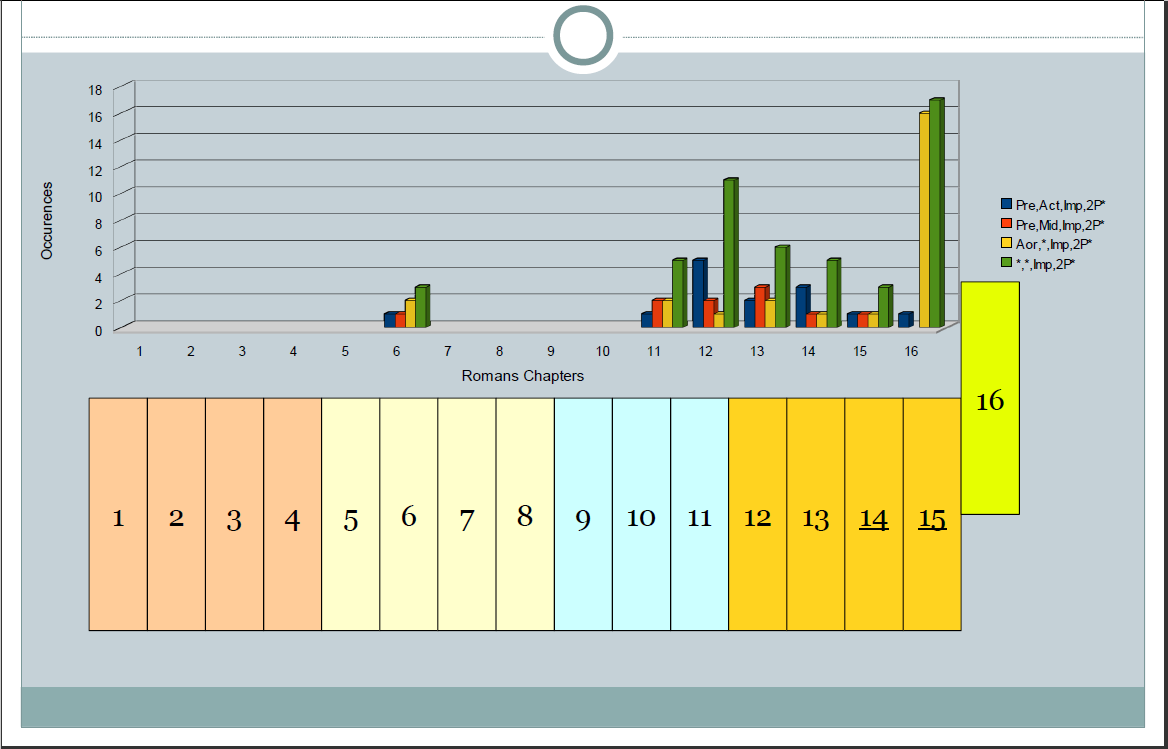QT 27/06/2024 Thu. Romans 16. Unity: Sincere Greetings. 真诚的问候

QT 27/06/2024 Thu. Romans 16. Unity: Sincere Greetings
READ http://www.esvbible.org/rom16
LISTEN
https://www.biblegateway.com/audio/mclean/esv/Romans.16
Romans 16 ends the themes of "accepting one another", "welcoming one another" and "unity" emphatically. See the attached chart. It summarizes the DISTRIBUTION of a particular kind of verb used by Paul, the second person (you/you all) COMMANDS (imperatives).
The green bars total up these imperatives. Romans 12-16 (the practical section) have many hits, but the highest occurrence is in Roman 16. He COMMANDED them to greet and welcome one another sincerely.
APPLICATION (1): GREET ONE ANOTHER sincerely to express this unity, acceptance and welcome (in view of the various kinds of unity set out in Romans 1-15). Paul COMMANDS readers to GREET ONE ANOTHER. He gives them a long list to greet, why greet them and how (Rom 16:1-16).
APPLICATION (2): When you greet one another, REMEMBER and THINK of the CONTRIBUTION that person has made for the gospel, like what Paul did:
(1) "She has been a patron of many" (Rom 16:2)
(2) "Risked their necks for my life" (Rom 16:4)
(3) "First convert" in Asia (Rom 16:5)
(4) "Worked hard for you" (Rom 16:6)
(5) They were "my fellow prisoners" (Rom 16:7)
(6) "Well known to the apostles" (Rom 16:7)
(7) They were "in Christ BEFORE me" (Rom 16:7)
(8) "Fellow worker in Christ" (Rom 16:9)
(9) "Approved in Christ" (Rom 16:10)
(10) "Who work hard in the Lord" (Rom 16:12)
(11) "Who has been a mother to me" (Rom 16:13)
APPLICATION (2): Can you think of a person whom you have DIFFICULTY accepting now? Think how items 1-11 above can be used to DESCRIBE that person, and attempt to welcome that person this week.
Nevertheless, Paul is in touch with the realities before him: There would always be those "who cause divisions and create obstacles contrary to the doctrine that you have been taught" (Rom 16:17). These serve "their own appetites" rather than the LORD (Rom 16:18).
APPLICATION: For these kind of people, Paul commanded them to "AVOID THEM" (Rom 16:17). Therefore, inclusiveness has its LIMITS. Learn to recognise their "smooth talk" and the cunning use of "flattery" to "deceive the hearts of the naive" (Rom 16:18).
APPLICATION (3): Strive for "unity" at church so that the "gospel" and "preaching of Jesus Christ" (Rom 16:25) can prosper, the gospel be revealed and made known to "all nations" effectively (Rom 16:26).
星期四 2024年6月27日 今日读经:罗马书16章. 合一:真诚的问候
http://m.bbintl.org/bible/ncv/Rom/16/
听音频罗马书16章
https://www.bible.com/bible/41/rom.16.cnvs
罗马书16章以“彼此接受”、“互相接纳”和“合一”为主题结束了此书。见所附的表。它概括了保罗所用的特定动词的分布和第二人称(你/你们)的指令(命令性的)。
绿色的线条是这些强制性的命令的相加。罗马书12-16(实际操作的部分)说中了好几点,但出现最多的是在罗马书16章。保罗命令他们要真诚的彼此问候及欢迎。
应用(1):诚恳地互相问候以表达合一、接受和接纳(为着罗马书1-15章里所提到的各种合一)。保罗命令读者要互相问候。他给了他们一张长长的名单问候他们,也列明为何要问候他们和如何问候(罗16:1-16)。
应用(2):当你互相问候时,记住并回想那人曾为福音所作出的贡献,就如保罗所做:
(1) “她曾经帮助许多人”(罗16:2)
(2) “他们为了我的性命,置生死于度外”(罗16:4)
(3) “亚西亚省第一个归入基督的人” (罗16:5)
(4) “为你们多多劳苦”(罗16:6)
(5) 他们全都是“与我一同被囚的”(罗16:7)
(6) “他们在使徒中是有名望的”(罗16:7)
(7) 他们“比我先在基督里”(罗16:7)
(8) “在基督里与我们同工的”(罗16:9)
(9) “在基督里蒙称许的”(罗16:10)
(10) “在主里劳苦的” (罗16:12)
(11) “她也是我在主里的母亲”(罗16:13)
应用(2): 你现在能否想到一个你很难接纳的人?思考一下,以上1-11项,你如何用来形容那个人,就趁这个星期尝试去接纳他。
尽管如此,对于眼前的事来说,保罗还是很是实际并坦诚的: 总会有一些“离间你们、绊倒你们、使你们违反你们所学的教义的人”(罗16:7)。这样的人不服事我们的主基督,只“服事自己的肚腹”(罗16:18)。
应用:对于这类的人,保罗的命令是“避开他们”(罗16:17)。所以说,包容也有一定的限度。要注意他们的“花言巧语”和恭维的话,用来“欺骗老实人的心。”(罗16:18)
应用(3):致力于教会的“合一”,以致“福音和耶稣基督所传的信息”(罗16:25)可以兴旺,福音被彰显并能有效地传到“万国”去(罗16:26)。


